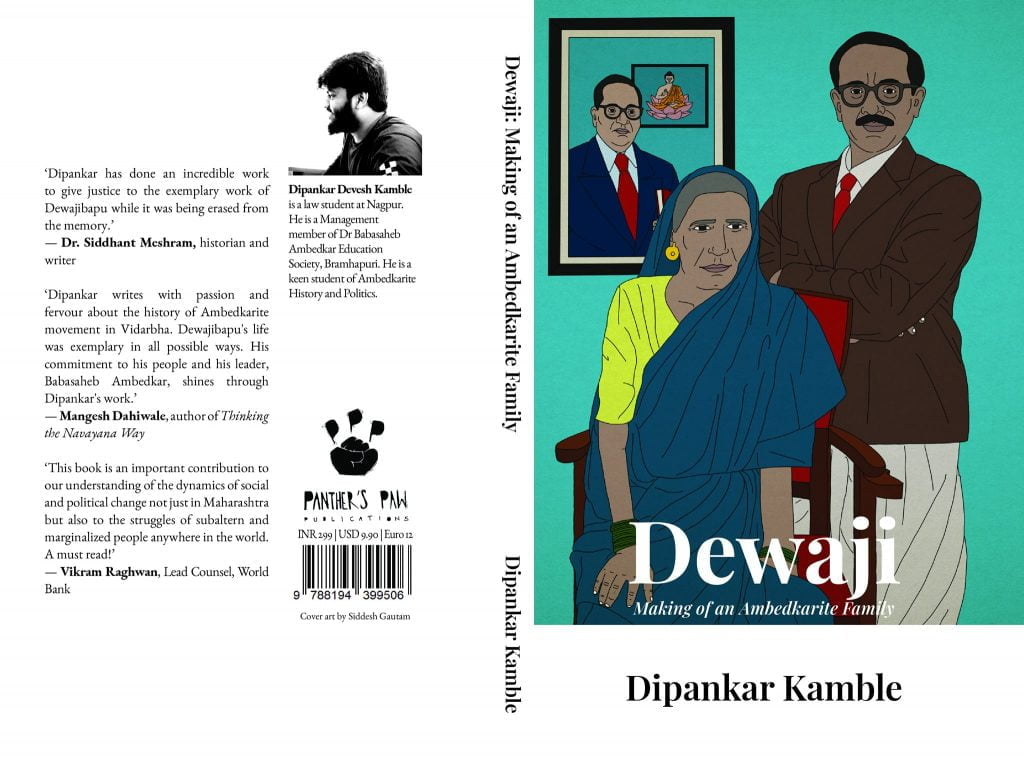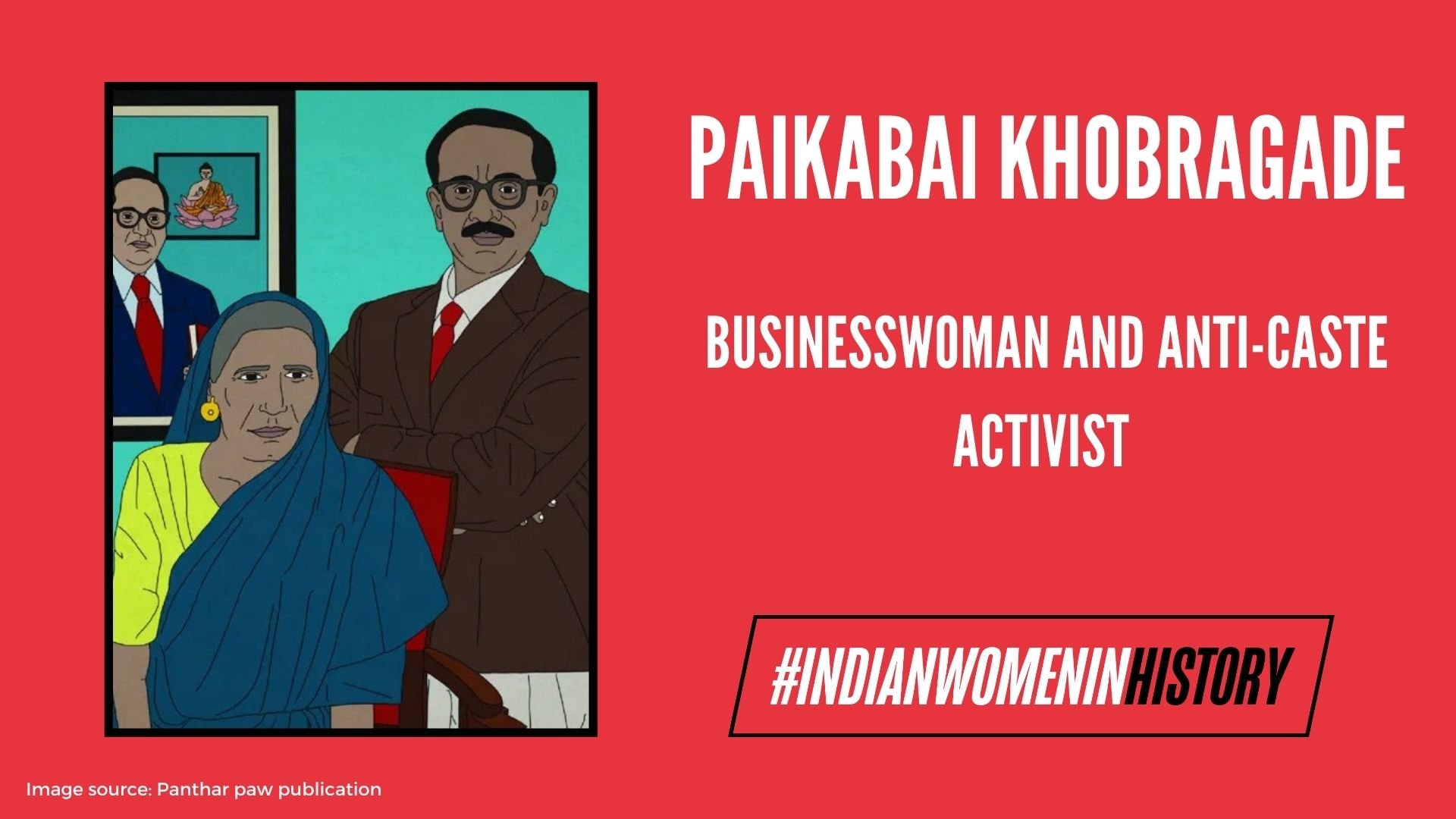What is the ‘so-called mainstream’ idea of a Dalit woman? Dishevelled clothes, impoverished frame, doing menial jobs, invisible workforce? Whom one wants to oppress at one’s worst and gaslight with saviour complex at one’s best? What if a historical figure contends that the marginalised condition of Dalit women is not because of their bare existence but because of one’s gatekept privilege, one’s oppressor-caste ancestral heritage of passing down trauma and exploitation to generations of Dalit women? What if this historical figure happens to be Paikabai Khobragade–a brilliant, bold, independent, compassionate Dalit businesswoman — from the nineteenth century?
Early Life and Work
Paikabai Khobragade was a Dalit entrepreneur and social activist. Her life, commencing in the 1800s, is a journey of ethereal strength and extraordinary grit. When Paikabai’s youngest son was only two years old, her husband Bhiwajibapu had an untimely demise. Undeterred, Paikabai continued to be financially independent, socially active and politically conscious. Instead of letting society dictate pre-defined premonitions to her at any dire juncture, she expanded her business with diligence and courage.
Paikabai Khobragade manifests the eventual step of diligent and successful Dalit women, who live life the way they want to, own land, spread education, generate employment, set up business houses, and celebrate life with affluence and dignity.
A fruit trader and cultivator, Paikabai Khobragade owned vast tracts of land and traded various fruits as both a retailer and a wholesaler. From mango groves to muskmelon, from watermelon farming to tamarind orchards and seeds, Paikabai extended her business across multiple states with diligence and acumen. She also managed a bullock cart business and focused sharply on her children’s education and entrepreneurship skills. She had three sons, and she taught them all to read, write and do mathematics ever since their early years.
Also read: The Young Feminists Forum 2019: The Chapter On Dalit Women
The Person She Was
Often, when speaking about Dalit women’s lives, a conscious and a subconscious categorisation is in action, which buckets each Dalit woman into a singular identity. While it is imperative to elucidate the anti-caste discourse and the marginalisation of the masses that Paikabai Khobragade fought against in order to provide education and employment to the oppressed, it is salient to explicate the particle nature of Paikabai as an individual.
Paikabai whole-heartedly appreciated the architectural places near the bus depot that she had inaugurated. She loved eating laamb rotya(long chapati) and further distributed it along with mango juice amongst people.
This humanisation is peremptory — something which dominant caste writers have hitherto failed at, that support is not always self-glorifying charity. Support is more often, and more precisely so — strength, empathy, equality and solidarity. That Dalit existence is not only data or deaths, or malnourishment or atrocity, all of which happen due to the brutality of so-called upper-castes. Dalits are also individuals who have a favourite food, endearing friendships, chosen colours, and love. Paikabai Khobragade was an individual who was replete with business acumen, bravery, intelligence, bold assertions, care for the family and community, and respect for the self.
Also read: Dalit Women Learn Differently: Experiences In Educational Institutions
Struggles she overcame
Across umpteen ‘so-called mainstream’ descriptions, women are solely defined by their aesthetics. In most incidents about Dalit women, their life is chronicled along with incidents where they are made the casteist system’s victims. However, Paikabai’s life is not a documentation of things that happened to her, but of what she created on her own.

In the book ‘Dewaji-Making of an Ambedkarite Family‘ published by the revolutionary Panther’s Paw Publications founded by Yogesh Maitreya, the author Dipankar Kamble, who is the great-great-grandson of Paikabai Khobragade, has dedicated an entire chapter to Paikabai’s bravery. He has reflected on the incident where Paikabai was harassed by a Brahmin man who was attempting to molest her when she was guarding her fields alone and how Paikabai had straightaway slapped him and asked him to go shout in his Brahmin locality that a Mahar woman named Paikabai had slapped him.
When dominant castes rarely acknowledge the workers’ contributions even though the monument is built on the labour of exploited Bahujans, Paikabai, from expressing gratitude towards the workers to appreciating their expertise, to taking care of their well-being, normalised the normal. Paikabai Khobragade’s life is an anti-caste documentation, discovery and literature on an independent path, which changes the dominant-caste narratives of Dalits being inhumanely treated while being coerced to work without labour rights to Dalits who generate employment for Bahujan workers.
The identity of the mother has hitherto been tied to the son in the dominant caste discourse when in fact it is the mother who creates and educates her son.
Final Years of her Resilience
Paikabai Khobragade staunchly upheld the youth’s economic independence and established herself as one of the Vidarbha region’s leading businesswomen. Later, she also encouraged her daughters-in-law to join the business. The oppressor caste tends to create Dalit women images as objects of pity, subjects of study, but never as symbols who recreate their destiny. The photographs and images of Paikabai have eyes full of compassion for the marginalised and conviction for the self. Paikabai’s life teaches us how historic it would have been if only this caste-ridden society followed Dr Ambedkar’s path.
Even though Paikabai’s family was affluent, they were still not spared from the perils of caste. Hence, as an assertive Dalit woman, Paikabai raised anti-caste feminist sons like Dewajibapu, who contended for equal rights and opportunities. Dewajibapu became a first-generation self-made millionaire and helped set up several institutions for the marginalised by providing membership, means and methods. Later, Dewajibapu became a close associate of Dr B R Ambedkar and carried forward a robust Dalit movement in the Vidarbha region. He was elected as an MLA of Dr Ambedkar’s Independent Labour Party, was the President of the Scheduled Castes Federation, and was the Female Education Society’s founding member.
The Lessons She Taught
The history that has been hitherto written by ignorant, apathetic, gatekeeping oppressor caste writers tends to tie the existence of Dalit women either around victimhood or around pedestalised resistance. It heinously believes that Dalit women fighting is the ultimate step towards the equity and equality of society. They burden the Dalit women to combat instead of urging the oppressors to stop oppressing and further providing reparations.
Also read: Sulochanabai Dongre: The Woman Who Advocated Birth-Control In Dalit Feminism | #IndianWomenInHistory
Paikabai Khobragade manifests the eventual step of diligent and successful Dalit women, who live life the way they want to, own land, spread education, generate employment, set up business houses, and celebrate life with affluence and dignity. Who do not exist in the destitute way so-called upper castes want them to do, neither do they have their time tethered solely around breaking stereotypes and barriers created by the so-called upper castes in the first place. Because whether Dalit women live subjugated lives or are continuously made to fight, their actions are forced towards either bowing or resisting — a reaction to the dominant castes’ actions. Paikabai’s narrative encourages Dalit women to spend their lives without compromising their choices or autonomy.
Her Valuable Contributions
Paikabai Khobragade’s life is not only a personal account; it is an extensive academic exposition detailing the discourse of the Ambedkarite movement, led by Dalit women. Paikabai’s life is a testament that no so-called upper-caste members can ‘give or take’ the Dalit women’s rights — that Dalit women are born with their birthrights. “I measure the progress of a community by the degree of progress which women have achieved.” – Dr Ambedkar.
Featured Image Source: Feminism In India
About the author(s)
Ankita Apurva was born with a pen and a sickle.





